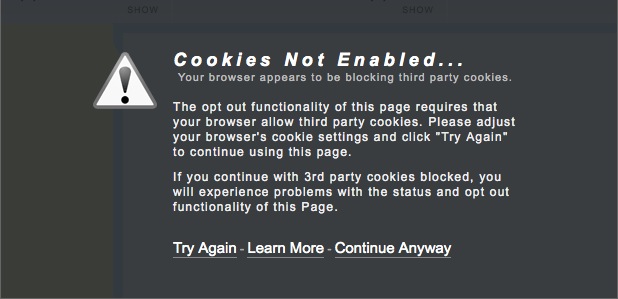FTC Advocates Do-Not-Track; Advertisers Upset
by Steve O'Keefe on December 3, 2010

Screen capture from the Interactive Advertising Bureau's "AboutAds.info" opt-out page. To install the IAB's opt-out software, users must expose their browser to significant privacy risks by enabling cookies.
On December 1, the U.S. Federal Trade Commission presented a preliminary report (PDF) outlining a “framework for privacy” that endorses a “Do-Not-Track” option for Web browsers similar to the agency’s popular “Do-Not-Call” service for telephones.
Unlike the Do-Not-Call program, which creates one central place where individuals can easily add their phone numbers to the list, with reprisals for companies that violate their preferences, the Do-Not-Track mechanism (“DNT”) will be built into the Web-browsing software and other applications used to access the Internet from computers, tablets, and smartphones. Each piece of software or app would have to include a DNT feature. Currently, there are no proposed guidelines for consistently implementing that feature, nor any real authority to enforce it.
Forbes‘ new privacy blogger, Kashmir Hill, says, “At the end of the day, this report isn’t going to change anything.” Kevin Fogarty, the highly opinionated blogger for ITworld‘s “CoreIT” blog, is blunt in his assessment, calling the FTC report:
[…] a set of recommendations with roughly the same clarity, credibility and impact of a strongly worded letter from the U.N. to this year’s evil dictator asking him to please not kill and eat so many villagers.
At The Huffington Post, consumer rights activist Jamie Court threatens a privacy initiative in California: “If Congress doesn’t act, we will go to the ballot.”
While Internet giants, including Google and Microsoft, have learned to tame their public pronouncements and pay lip service to the FTC’s recommendations, they let the trade groups they fund do the barking for them. Mike Zaneis, senior vice president and general counsel of the Interactive Advertising Bureau (IAB), is quoted by The New York Times media reporters Edward Wyatt and Tanzina Vega as saying that the DNT mechanism will cause “significant economic harm” if it has “a high participation rate similar to that of do not call.”
The IAB is recommending voluntary measures where sites place prominent “opt-out” buttons that disable tracking, rather than a central registry or browser build-ins. The organization touts its AboutAds.info site, where you can opt out of being tracked by a very small group of sites that participate.
John and Carrie Vanston devote a major section of their new book, MINITRENDS, to business opportunities arising from increasing interest in privacy. They predict that the U.S. will strengthen its privacy laws, opening up profitable new business lines for entrepreneurs:
The federal government of the United States has adopted only limited formal legislation to protect privacy compared to Canada and most European countries.
Among the businesses that will profit from strengthening privacy laws are software developers, training firms, and the new field of online reputation management companies.
Certainly, someone needs to come up with a solution better than the IAB’s “opt-out” site. When this reporter visited the site to test the opt-out features, I was advised I would have to enable cookies in order to install the software (see screen capture, above). While enabling cookies would protect me from being tracked by few dozen sites participating in the IAB’s program, it would open me to tracking by the millions of sites that not only don’t participate, but sometimes use methods that are much more intrusive than those of IAB’s supporters — methods which remain, unfortunately, virtually unregulated.
STEVE O’KEEFE
News Editor, Minitrends Blog
Source: “Protecting Consumer Privacy in an Era of Rapid Change” (PDF), Federal Trade Commission, 12/10
Source: “Brief Takeaways — and a Pretty Diagram — from the FTC’s Online Privacy Recommendations,” Forbes, 12/01/10
Source: “FTC becomes aware there is an Internet,” ITworld CoreIT Blog, 11/17/10
Source: “Will We Get a ‘Do Not Track Me’ List for Our Personal Information Online?” The Huffington Post, 12/01/10
Source: “F.T.C. Backs Plan to Honor Privacy of Online Users,” The New York Times, 12/01/10
Source: MINITRENDS How Innovators & Entrepreneurs Discover & Profit From Business & Technology Trends, p. 97.
Image from AboutAds.info, the Interactive Advertising Bureau’s “opt-out” site, screen capture recorded 12/02/10. Used under Fair Use: Commentary.
Comments
Got something to say?













